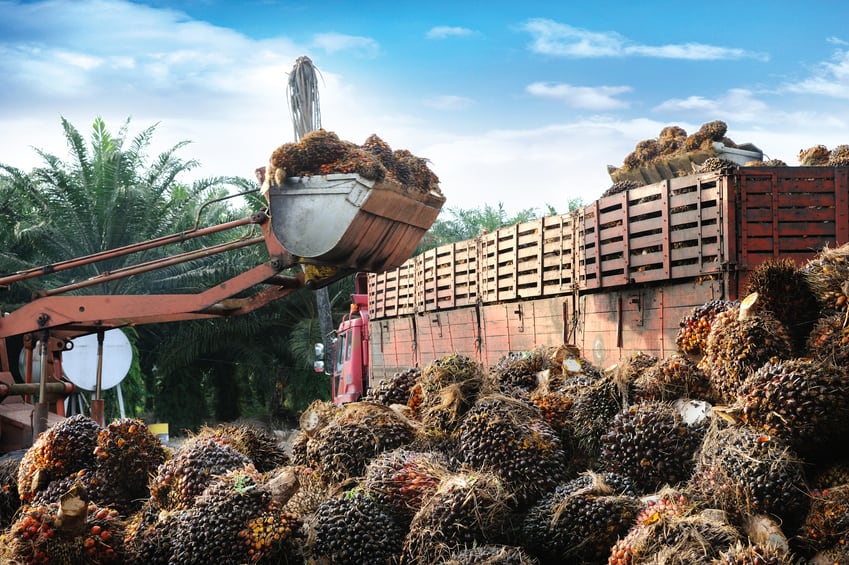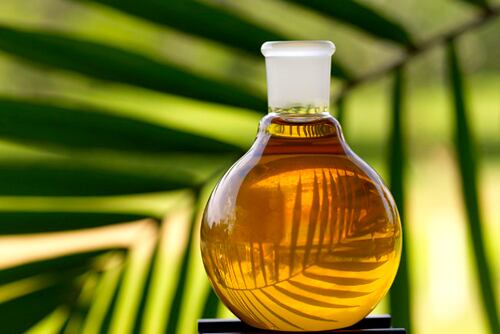The NGO interviewed 120 workers on palm plantations owned by two subsidiaries of Wilmar and three suppliers located in Kalimantan and Sumatra, Indonesia.
The report, The great palm oil scandal: Labour abuses behind big brand names, outlines cases of children as young as eight doing physical work without safety equipment and carrying sacks of palm fruit that can weigh between 12 and 25 kg. Some said they had dropped out of school to help their parents on the plantations.
The report claims workers on Wilmar operations were also forced to work long hours or risk having their pay docked and were paid below the minimum wage for the Indonesian province in question – some received as little as US$2.50 per day.
Others were said to have suffered severe injuries from using paraquat, a pesticide that is banned in the EU and by Wilmar itself due to toxicity.
Amnesty International traced Wilmar’s palm oil back to nine global firms: ADM, Kellogg’s, Nestlé, Unilever, Colgate-Palmolive, Elevance, AFAMSA, Procter & Gamble and Reckitt Benckiser.
Ongoing issues
Singapore-based agri-giant Wilmar is the largest processor and merchandiser of palm and lauric oils in the world. It welcomed the report for helping to highlight labour issues within the wider palm oil industry and in Indonesia specifically.
Just under half (45%) of the world’s palm oil comes from Indonesia and the sector employs three million workers.
“Wilmar has put a lot of effort and systems in place to deal with labour and social issues in our operations and supply chain. We acknowledge that there are ongoing labour issues in the palm oil industry, and these issues could affect any palm company operating in Indonesia,” said a statement by the company.
Its 2015 sustainability report identified a need to improve monitoring and enforcing its labour commitments, and this would continue to be refined, it said.
It also began working with the Roundtable on Sustainable Palm Oil (RSPO) to address some of the issues before publication of the report.

Paper promises
However, the report is bad news for RSPO. In addition to Wilmar, three of the five palm growers and eight of the nine food and personal care manufacturers mentioned in the report are RSPO-certified.
These manufacturers make claims of sustainable palm oil on their websites or product packaging.
Meghna Abraham, senior investigator at Amnesty International said: “Corporate giants like Colgate, Nestlé and Unilever assure consumers that their products use ‘sustainable palm oil’, but our findings reveal that the palm oil is anything but. There is nothing sustainable about palm oil that is produced using child labour and forced labour.
“The abuses discovered within Wilmar’s palm oil operations are not isolated incidents but are systemic and a predictable result of the way Wilmar does business. Something is wrong when nine companies turning over a combined revenue of $325 billion (€306bn) in 2015 are unable to do something about the atrocious treatment of palm oil workers earning a pittance.”
Using RSPO 'as a shield'
According to Seema Joshi, head of business and human rights at Amnesty International, these manufacturers are using RSPO as “a shield to deflect greater scrutiny”.
Although the firms have strong sustainability policies on paper none could demonstrate that they had identified obvious risks of abuses in Wilmar’s supply chain, she said.
Only two of the companies, Kellogg and Reckitt Benckiser, offered information on which products could contain Wilmar palm oil.
Mondelez refused to confirm if it had sourced or currently sources Indonesian palm oil from Wilmar either directly or indirectly, instead giving information about its broad engagement with suppliers and its in-house palm oil action plan, the report says.
However, Amnesty International points to information in the public domain which suggests that the company purchased palm oil from Wilmar in 2013.

Traceability troubles
Meanwhile, the report says that apart from ADM, which has made public its traceability data, the companies are staying tight-lipped on the source of their palm oil, be it from refineries, mills or plantations.
“Without publicly disclosing this information, the buyers, other than ADM, are not acting in the public interest and interests of the ethical consumer. They claim to the public that their products use certified or sustainable palm, but their refusal to put traceability information into the public domain is ensuring that no one can verify their claims,” reads the report.
“This lack of transparency by companies obstructs the ability of consumers, environmental and human rights groups to check if the products are made using ‘sustainable’ palm oil. This in turn denies the individual consumer the opportunity to seek verification about the products they purchase, and interferes with their ability to make informed choices.”
A statement made by Nestlé said Wilmar supplies around 10% of its total palm oil. "We are working closely with the company to improve traceability. Now, 83% of the volume that we purchase is traceable back to the mill of origin and 11% is traceable to plantation. This traceability does not yet extend to the plantations at the centre of the allegations in Amnesty International’s report.”
Nestlé added that suppliers that fail to meet the provisions in its Supplier Code, including on labour rights, will be suspended, although it did not comment specifically on whether it planned to suspend Wilmar.
Kellogg said in a statement it is committed to working with our global suppliers to source fully traceable palm oil to known and certified sources that are environmentally appropriate, socially beneficial and economically viable.
“If we find, or are made aware of, any supply chain violations of our global palm oil principles, we work with the supplier to understand corrective actions and ensure they understand our commitments. If the concerns are not adequately addressed, we take action to remove them from our supply chain.”
To read all the companies’ letters of response to Amnesty International click here.
What is the EU doing?
Europe is the world’s second biggest customer of palm oil and imported palm oil volumes worth €3.4 billion in 2014.
The European Parliament’s Committee on Environment, Public Health and Food Safety (ENVI) is currently in the process of debating a draft motion for a resolution on actions the EU can take to make palm oil more sustainable.
Its rapporteur, Czech MEP Kateřina Konečná, said all stakeholders – be it the EU, producer countries, private businesses or NGOs - must play a part in resolving these issues affecting the commodity
“The Amnesty International report shows us that some businesses related to palm oil are not considering issues of sustainability and human rights in their actions and therefore they refuse to take a part in this process,” she told us.
“If companies are not responsible for their actions and if they don't act in the best interest of our planet and people they should face the consequences.”
Konečná’s draft report was debated by ENVI politicians this week and is expected to go to plenary session in April next year.
